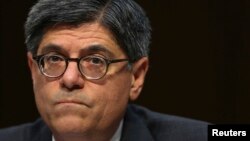U.S. Treasury Secretary Jack Lew said he does not see the Greek debt crisis or China’s market volatility as direct threats to the U.S. economy, but he nevertheless urged China to maintain its pace of economic reform.
Also, days before a European Union summit on Greece, Lew called on Greece’s creditors to give Athens a sustainable debt and growth path.
Speaking Wednesday at the Brookings Institution think tank in Washington, Lew said that while China’s markets are not fully integrated in the global financial system, the recent sharp decline in Chinese stock values raises concerns about long-term growth in China.
"How do China’s policymakers respond to this and what does it mean in terms of the core condition of the economy?" he asked.
Commitment to reform
Lew said Chinese officials have a “quite determined” commitment to a reform agenda, and that they have clearly set forth a plan to allow market forces to work in the economy.
"The question isn’t their commitment to the goal. The question is the pace at which they implement it and do they do it fast enough for it to be effective," he said. "I hope this is not something that slows down the pace of reform.
"So, that’s something we’ll continue to look at. We’ll monitor the situation directly. They’ve got a set of policies that they’ve outlined which, if they implement them, I think will make China’s economy much stronger in the future," Lew said.
He said China is moving from a highly centralized, industrial economy to a more market-oriented and consumer-oriented economy, leading to slower but more sustainable growth and improving the lives of the Chinese people and boosting the global economy.
"If the reaction is to put the brakes on reforms, that will slow that process," Lew said.
He added that after last month’s bilateral Strategic and Economic Dialogue, U.S. officials did not alter their view of China’s commitment to a reform agenda.
No direct economic threat
The Treasury Secretary said neither Chinese market volatility nor the Greek debt crisis pose an immediate threat to the U.S. economy.
Regarding the situation in Greece, he maintained that it is in the best interests of all parties involved to find a resolution so Greece’s debt is restructured and the country is put on a path toward sustainable growth.
"I think it’s a mistake for the European economy, the global economy to take the risks that are involved with an uncontrolled crisis in Greece," Lew said. "Before things broke down and they went to a referendum they were within a couple billion euros of closing the gap.
"There are hundreds of billions of risk and a couple billion dollars of space. For any of us who have participated budget and fiscal policy discussions, you usually wouldn’t buy hundreds of billions of dollars of risk for a couple billion-dollar gap," he added.
Lew said he believes there remains a solution to the Greek fiscal crisis.
Reluctance
But, he said, the reluctance to restructure European debt is deep on the part of many European players.
He said the question to be answered in the next few days is: "Can the parties build enough trust so Greece can take the actions it needs to so Europe can restructure Greek debt and make it more sustainable?"
Lew said Sunday’s European deadline to reach agreement has raised the risks to the global economy and Greeks will very soon run out of cash. Now, he said, is time to get a deal done.
